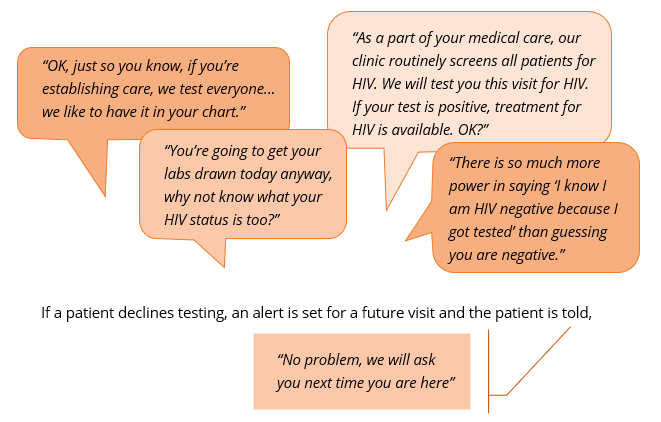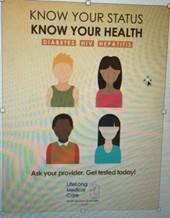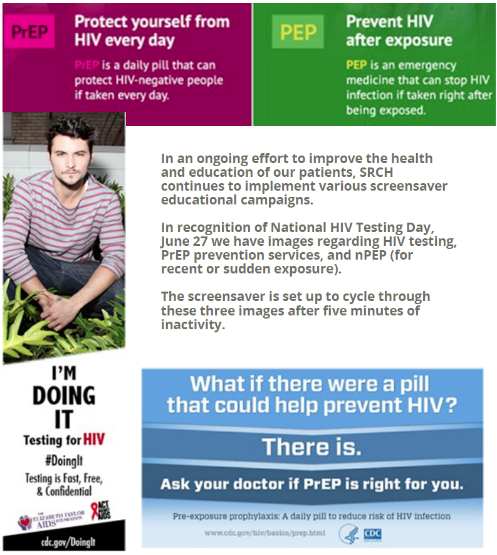Shift Patient Knowledge, Attitudes & Beliefs
Our organization’s philosophy is ‘meeting patients where they are,’ but you also need to steer them in better directions.
– Chief of Psychiatry and former Medical Director, Brookwood site
Have Positive Conversations around HIV Testing
Clinic staff, from the front desk to the clinician, all play a role in expanding patients’ knowledge, attitudes and beliefs about HIV. Efforts to educate patients must therefore begin with making sure staff understand all issues around HIV testing, treatment and prevention. The more comfortable staff feels discussing these topics, the less stigma patients will feel. Reducing stigma around HIV and AIDS is one key end result of shifting patient knowledge, attitudes and beliefs.
Practicing patient conversations during training time helps to give staff confidence to bring up the topic with patients. It’s also helpful to make sure everyone knows who to call for back-up if questions come up they can’t answer. You may start with a script, but staff also need time to work out a way to convey information that feels comfortable for them and fits their patient population. This includes practicing dialog in other languages.
Patients shouldn’t feel singled out because of personal characteristics or history. Normalize testing by explaining that testing is a routine part of the practice and is done for everyone. Make it comfortable and easy for patients to agree to be tested. Here are a few ways staff have explained HIV testing to their patients:

Sometimes after an initial decline, when patients are asked by multiple staff, they change their minds and agree to testing. In fact, statistics show increased testing rates where all levels of staff are engaged in the intervention. For example, if a patient enters, sees a flyer about HIV testing, then checks in and is given a card about HIV testing, then the MA offers the test, and the provider affirms “we test everyone,” the patient is more likely to feel comfortable and agree to be tested, and less likely to feel profiled or singled out as “looking high-risk.” Having multiple staff members asking further normalizes the test.
Use Educational Materials & Patient Incentives
Reinforce the staff’s interactions around HIV testing with simple, positive educational materials. Keep text short and to the point.
We created a series of posters placed in clinic lobbies and bathrooms that sought to normalize HIV testing as part of all routine  health testing. The poster included HIV along with diabetes, hepatitis, heart disease and cancer. This also harmonized with other agency-wide screening initiatives with the goal of raising awareness of all the routine care screenings a patient might need. We tried to create a graphic, attractive image that was also inclusive of our diverse patient population in terms of age, gender, race and sexual orientation. The poster’s heading stated simply, “KNOW YOUR STATUS / KNOW YOUR HEALTH.”
health testing. The poster included HIV along with diabetes, hepatitis, heart disease and cancer. This also harmonized with other agency-wide screening initiatives with the goal of raising awareness of all the routine care screenings a patient might need. We tried to create a graphic, attractive image that was also inclusive of our diverse patient population in terms of age, gender, race and sexual orientation. The poster’s heading stated simply, “KNOW YOUR STATUS / KNOW YOUR HEALTH.”
Videos are another good way to spread the word about HIV testing. Play them in the lobby or other patient waiting places. We created a patient video that explained:
We test everyone for HIV, regardless of sex, gender, sexual orientation, race, ethnicity, or health history. HIV isn’t a death sentence anymore: thanks to advances in modern medicine, HIV can be managed just like any other chronic illness. SRCHC is committed to eradicating HIV, and we offer compassionate care to help people with HIV lead healthy, active lives. The only risk is not knowing.

We played it in clinic lobbies and placed a copy on our website and on YouTube. We also used screensavers to provide bits of educational materials both to patients waiting for providers and for the providers themselves.
Patient incentives are another way to advertise efforts to screen for HIV. Backpacks, notepads, pens, and other small “swag” let your patients know that every patient is tested for HIV. It keeps them from feeling singled out and reduces the stigma around testing. For example, we had front desk staff hand out small cards with our “We test everyone” message telling them to hand back the cards to the MA to receive a goodie.
A Quick Clinic Story: Patient Education Identifies a Positive Case
A 53-year old female received a diagnosis of bipolar disorder. She had no reported risk factors for HIV and reported no sexual activity for more than two years. The provider offered her a rapid, in-house HIV screening. She was reluctant to be tested but the provider assured her, “We test everyone. It only takes a few minutes, and wouldn’t you like to know?” She agreed. Her rapid test came back preliminary reactive. Labs were ordered and the HIV Team was notified to assist. The confirmatory test was positive and the patient is now active in care.
Resources
- HIV Training Video- Patient Dialog Scenarios: Practice Makes Perfect: MA-Patient Dialogue Scenarios (.mov)
- HIV Testing Script: Sample script showing how to explain testing to patients (.pdf)
- We test everyone! Know your health, know your status: Patient video introducing HIV testing (link)
- Know Your Status, Know Your Health postcard flyer (.pdf)
- We Test Everyone pamphlet – English (.pdf)
- We Test Everyone pamphlet – Spanish (.pdf)
![$logo['alt']](https://srhealth.org/wp-content/uploads/2017/03/srch-logo-1.png)